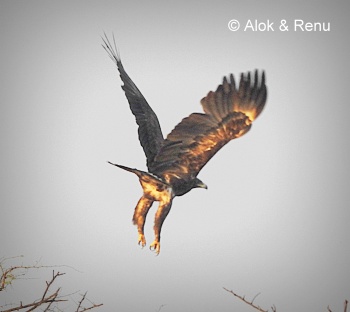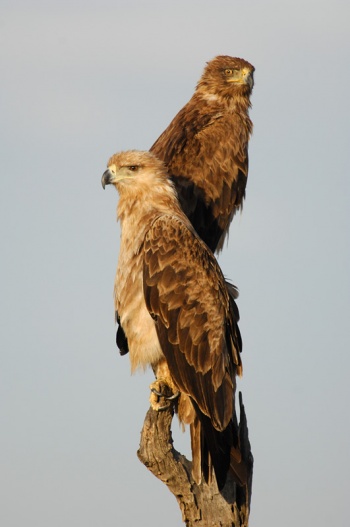- Aquila rapax
Identification
60–75 cm (23½-29½ in)
Tawny upperparts and blackish flight feathers and tail. The lower back is very pale.
Tawny Eagle has nostrils on a diagonal that is almost vertical, and the gape goes back only to mid eye. The iris is honey coloured and the bill heavy.
Similar species
Wahlberg's Eagle and Steppe Eagle
Distribution

Photo © by Alok Tewari
Keoladeo National Park, Bharatpur, India, February-2016
Africa. Widespread and common in sub-Saharan Africa breeding from southern Ethiopia and northern Kenya south to eastern South Africa. Also breeds within the Western Palearctic in Morocco and a small area of northern Algeria. Formerly also bred in Tunisia. Locally also in India, Pakistan and southern Nepal.
Mainly resident but has occurred further north in Morocco and as a vagrant elsewhere in North Africa east to Egypt and exceptionally also recorded in Israel. In Europe recorded in Spain and Sardinia.
Taxonomy
Considered conspecific with Steppe Eagle A. nipalensis by some authors.
Subspecies
Three subspecies recognized[1]:
- A. r. cirtensis:
- North Africa
- A. r. rapax:
- Africa south of the Sahara
- A. r. vindhiana:

Photo © by Alok Tewari
Keoladeo National Park, Bharatpur, India, March-2019
Vindhiana is sometimes included in Steppe Eagle or accepted as full species.
Habitat
Semi-arid Acacia savanna, and also semi-desert, and steppes.
Behaviour
Breeding
Their clutch contains 1–3 eggs.The nest is constructed from sticks and placed in small trees, crags, rocks and ruins, or on the ground.
Diet
The diet consists largely of fresh carrion; it will kill small mammals up to the size of a rabbit, reptiles and birds up to the size of guineafowl. It will also steal food from other raptors.
Gallery
Click on photo for larger image
Juvenile
Photo © by mikemik
Serengeti National Park, Tanzania, May 2018Nominate subspecies
Photo © by Mybs
Kgalagadi Transfrontier Park, South Africa
References
- Clements, J. F., T. S. Schulenberg, M. J. Iliff, D. Roberson, T. A. Fredericks, B. L. Sullivan, and C. L. Wood. 2018. The eBird/Clements checklist of birds of the world: v2018. Downloaded from http://www.birds.cornell.edu/clementschecklist/download/
- Sinclair et al. 2002. Birds of Southern Africa. Princeton Field Guides, Princeton, New Jersey, USA. ISBN 0-691-09682-1
- Birdforum thread discussing nostril characters
Recommended Citation
- BirdForum Opus contributors. (2024) Tawny Eagle. In: BirdForum, the forum for wild birds and birding. Retrieved 1 September 2024 from https://www.birdforum.net/opus/Tawny_Eagle
External Links
GSearch checked for 2020 platform.1






